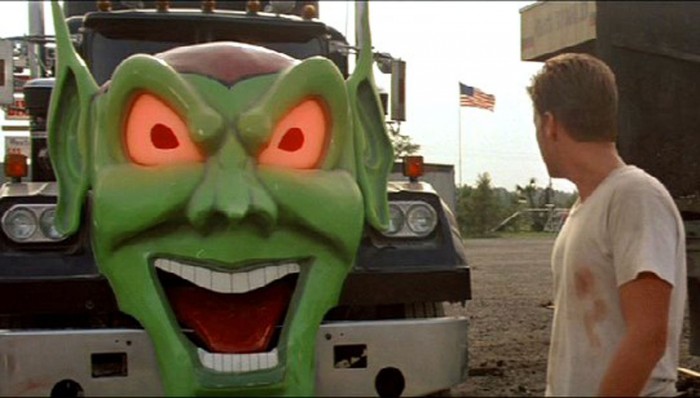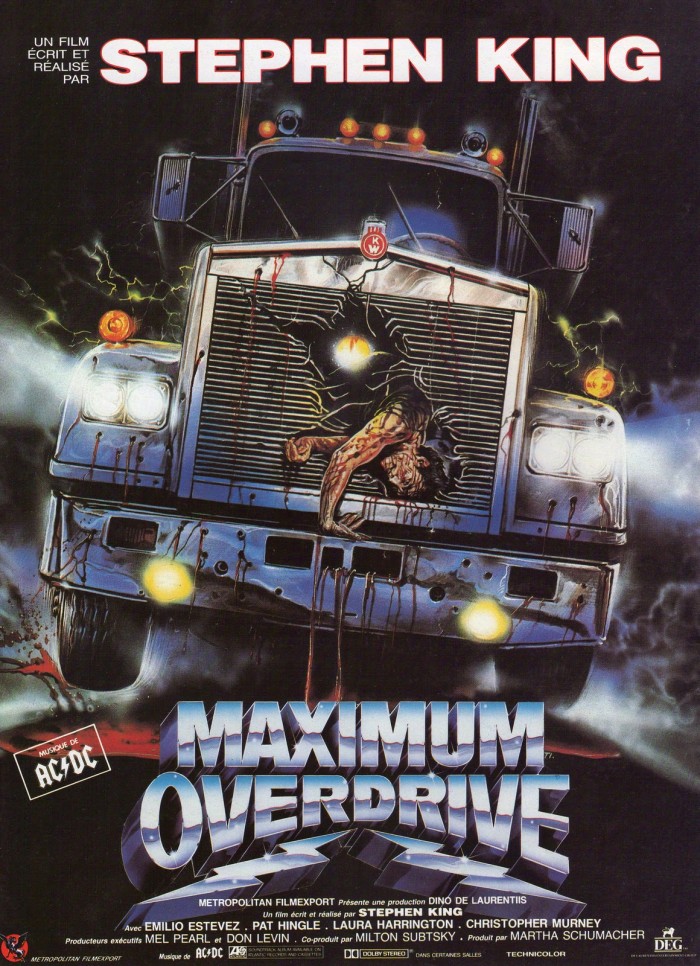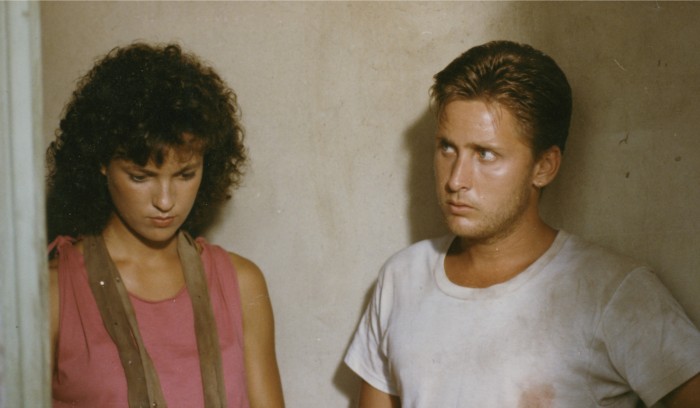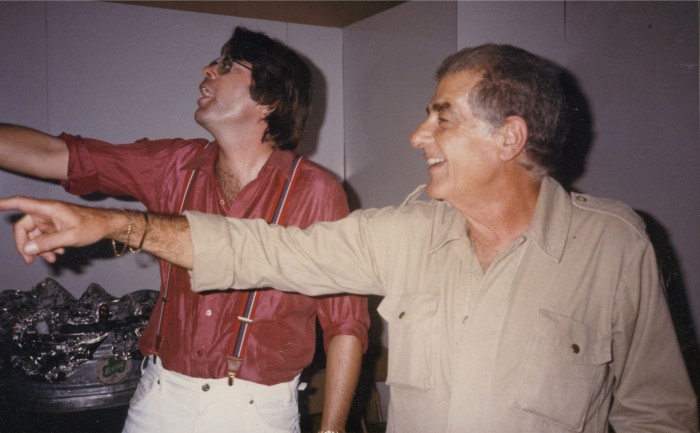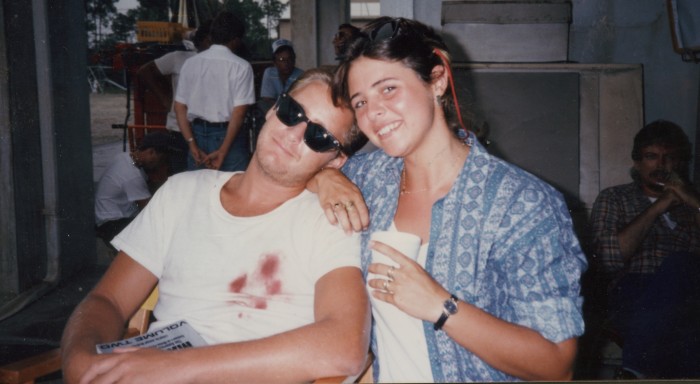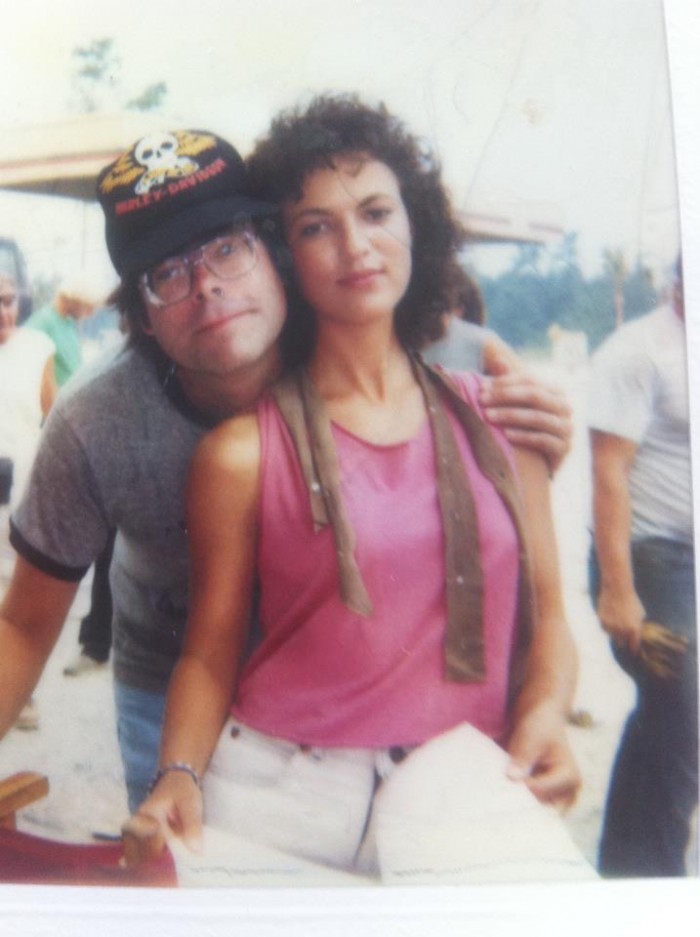How Did This Get Made? Maximum Overdrive (An Oral History)
We may receive a commission on purchases made from links.
Trucks + Sentience – Compelling Narrative = How Did This Get Made?!?!
Nobody sets out to make a bad movie. But the truth is, it happens all the time. Every time it does, there's a fun misadventure and cautionary tale lurking somewhere behind the scenes. This is that story for Stephen King's directorial debut-turned-conclusion: Maximum Overdrive.
How Did This Get Made is a companion to the podcast How Did This Get Made with Paul Scheer, Jason Mantzoukas and June Diane Raphael which focuses on movies so bad they are amazing. This regular feature is written by Blake J. Harris, who you might know as the writer of the book Console Wars, soon to be a motion picture produced by Seth Rogen and Evan Goldberg. You can listen to the Maximum Overdrive edition of the HDTGM podcast here. Synopsis: After a freak cosmic occurrence, machines everywhere come alive and lash out against their human makers. As a result, a group of survivors (led by Emilio Estevez) holed up in a North Carolina truck stop are eventually forced to go toe-to-toe with a fleet of homicidal trucks.Tagline: The Day Horror Went Into Overdrive
In July 1973, Cavalier magazine published a short story called "Trucks" by a relatively unknown Maine-based writer named Stephen King. The piece was about a group of strangers, trapped together in a freeway truck stop diner, who must eventually try to combat a posse of killer vehicles. Five years later—following the monster success of King novels like Carrie (1974), 'Salem's Lot (1975) and The Shining (1975)—"Trucks" was republished in a short story collection called Night Shift.
Given these earlier iterations of the story that would eventually be adapted into Maximum Overdrive, it's tempting to believe that the origin of this film begins around the time of either publication. But in actuality, the true start of Maximum Overdrive—and the on-set hijinks and horror that would ensue—begins a few years after that, with the filming of a different Stephen King book (Firestarter) and the legendary producer (Dino De Laurentiis) working to get it made...
Here's what happened, as told by those who made it happen...
Maximum Overdrive Oral History
Featuring:
Photo Credits: All the on set photos featured in this Maximum Overdrive oral history come thanks to Silvia Giulietti unless otherwise noted.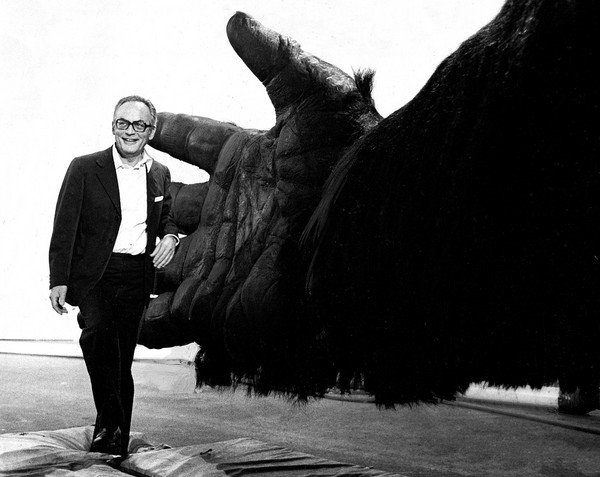
Part 1: Dino’s World
One of traits that made Dino De Laurentiis an excellent producer was his audacity to film in locations outside of Los Angeles. Especially in an era where most movies were being shot inside of Hollywood studios. But Dino—who grew up the son of a spaghetti factory owner in Naples, Italy —saw things differently. He was fearless, always. And that relentless temperament is part of what later earned him the personal and professional affection a stunning bookkeeper-turned-producer by the name of Martha Schumacher.Martha: Dino made King Kong in Los Angeles. In the back lot of MGM. But he wasn't afraid to make pictures elsewhere, whether that meant New York, Mexico or Morocco. He was one of the only Western producers to shoot in the Soviet Union. He would go wherever he needed in order to get the most value up on the screen. That's always what it was about: value on the screen.To her point, Dino De Laurentiis produced several NYC-based classics in the 1970's. Martha: He was very successful with Serpico, The Valachi Papers and Three Days of the Condor. You had all those great pictures, each showing off a different side of the city by taking it to the streets. And that transitioned to the stories as well. They became very gritty, and you had the neo-realism of New York.Roberto: [speaks with a fast-paced, frenetic Italian accent] The reason, also, that he did all of this—shoot outside Los Angeles—was to make the movies for less. In California, there are all these laws, taxes, bullshit. So Dino just went to other places. That's the smart business guy Dino was. He was basically the guy who invented the role of the executive producer. I worked with him for 20 years and one thing he like to say was: "If you're going to make a buck...why not make more than a buck?"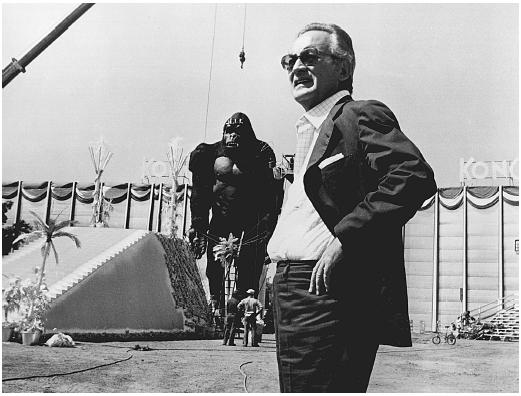 For 20 years, Roberto Croci served as a translator to Dino De Laurentiis. Although Dino spoke with a bit of an accent, his English for the most part was fine. It was passable. So why did he frequently have a translator by his side? To translate scripts into his native language and, because he kept close ties with the filmmaking community in his homeland; frequently working with the best talent that Italy had to offer. Roberto: When Dino came to America, he was already the biggest Italian producer ever. He did epic movies in Italy—like War & Peace, Barbarella and La Bibba with Charlton Heston—and then he had also done Flash Gordon in London. But even after he came over here—running an American company with American rules—he always retained his Italian quality. In any building, or in any office where he set up tent, he always had to have the biggest corner office. And always there would be red-color carpet and an oversized desk (so people would feel a little smaller than him).Martha: Being an Italian, Dino favored highly the Italians. Though I think Italian cinematographers were—and very well still might be—the best in the world. And, in fact, we had an Italian director of photography [Giuseppe Ruzzolini] on Firestarter. We had really great people on that one—and Drew Barrymore was just adorable—but what we struggled with was where are we going to shoot it? Dino was actually looking at an issue of Southern Accents magazine—to search for places that looked "south"—and he saw a picture of Orton Plantation, which is right outside of Wilmington [North Carolina]. And it looked beautiful. With this big white mansion that could be a bucolic façade where, you know, behind the walls, the worst things imaginable happened. So Dino thought this was perfect and said, "Let's go there!"Roberto: When Dino offered me my job he said, "Okay, three things: no union, no politics, two weeks vacation." I said, "Okay. Okay. But three weeks vacation...because I'm Italian." That was it. That's how I got started with Dino. And it shows also a little bit of why Wilmington, North Carolina.Martha: One of the major advantages to North Carolina is that it was a Right to Work state. As was South Carolina. Meaning that you weren't obligated to bring in union people. And so that was kind of the pea of the idea. And it led to a bit of a war between the governors of North and South Carolinas–they both wanted our business—but, in the end, because of that magazine cover Dino that had seen, we decided to film Firestarter in North Carolina.
For 20 years, Roberto Croci served as a translator to Dino De Laurentiis. Although Dino spoke with a bit of an accent, his English for the most part was fine. It was passable. So why did he frequently have a translator by his side? To translate scripts into his native language and, because he kept close ties with the filmmaking community in his homeland; frequently working with the best talent that Italy had to offer. Roberto: When Dino came to America, he was already the biggest Italian producer ever. He did epic movies in Italy—like War & Peace, Barbarella and La Bibba with Charlton Heston—and then he had also done Flash Gordon in London. But even after he came over here—running an American company with American rules—he always retained his Italian quality. In any building, or in any office where he set up tent, he always had to have the biggest corner office. And always there would be red-color carpet and an oversized desk (so people would feel a little smaller than him).Martha: Being an Italian, Dino favored highly the Italians. Though I think Italian cinematographers were—and very well still might be—the best in the world. And, in fact, we had an Italian director of photography [Giuseppe Ruzzolini] on Firestarter. We had really great people on that one—and Drew Barrymore was just adorable—but what we struggled with was where are we going to shoot it? Dino was actually looking at an issue of Southern Accents magazine—to search for places that looked "south"—and he saw a picture of Orton Plantation, which is right outside of Wilmington [North Carolina]. And it looked beautiful. With this big white mansion that could be a bucolic façade where, you know, behind the walls, the worst things imaginable happened. So Dino thought this was perfect and said, "Let's go there!"Roberto: When Dino offered me my job he said, "Okay, three things: no union, no politics, two weeks vacation." I said, "Okay. Okay. But three weeks vacation...because I'm Italian." That was it. That's how I got started with Dino. And it shows also a little bit of why Wilmington, North Carolina.Martha: One of the major advantages to North Carolina is that it was a Right to Work state. As was South Carolina. Meaning that you weren't obligated to bring in union people. And so that was kind of the pea of the idea. And it led to a bit of a war between the governors of North and South Carolinas–they both wanted our business—but, in the end, because of that magazine cover Dino that had seen, we decided to film Firestarter in North Carolina.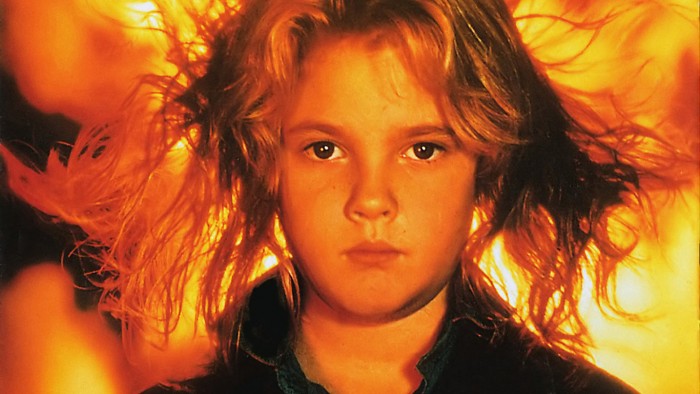 With a budget of $15 million, Firestarter's domestic box office ($17 million) might seem like only a modest success. But at the crux of De Laurentiis' business strategy was his talent for pre-selling foreign rights. So when considering all the many territories out there—and the fact that Dino was one of the few producers who could actually close those kinds of deals—the success of Firestarter was anything but modest. In fact, it proved to be the beginning of an entirely new business plan. Martha: During Firestarter, we just kind of fell in love with North Carolina and the idea of setting some roots. Really starting a film base down there and making a life for ourselves as well. That was really important to Dino: that we enjoyed living where we shot. So we ended up building a fifty-acre film studio in Wilmington and a home over in Wrightsville. And the town embraced us. There wasn't a sense of them trying to say no you can't do this or that. And that's what filmmaking used to be. You have an idea. You have a handshake. Let's do it. And that's what this was. We didn't go in and take over. There was a cooperativeness to what we were doing and a love of us being there. There was a honeymoon feeling and it was just the best time. The best time. The booming '80s!Roberto: Dino loved Martha. He loved Martha, there was no doubt about it. The first time I heard about her was when I went from Los Angeles to New York. Dino had an office there—at the Gulf and Western Plaza—and people there told me about her. "Martha," they say, "is something that Dino likes."Martha: When I was a little girl, I used to watch Perry Mason. And I loved the character of Della Street. I loved how she always brought in those clues—those clues that solved the mystery—and how she helped Perry Mason be the success that he was. So I thought: that's what I want to do when I grow up. I want to be contributory to someone's success. 'Cause in my generation—of little girls who graduated in the 50s, 60s and early 70s—unless you had parents who were doctors, lawyers or of a higher profession, you were basically encouraged to either be a nurse, a teacher or a secretary. And so, just like Della Street, I decided to be a secretary.Roberto: I do believe, but am not completely sure, that Martha started with Dino in the accounting department.Martha: That's right. Because it just so happened that after I graduated from college, I moved to New York and modeled for a short time. I had actually gotten a modeling contract in high school but after college, for that now to be my career, it proved not to have that exalted goal of helping someone to be great. It was not my cup of tea, so I used the accounting experience that I had from college to look for some other jobs. During the days, I would do bookkeeping for a few different companies and then, at night, I would waitress at Rick Newman's "Catch a Rising Star." It was a famous comedy club on the Upper East Side. Larry David came out of there, Jerry Seinfeld too. And Richard Belzer used to emcee. It was just a great time! And what happened was that a waitress friend of mine—who was working for an extras casting agency—she told me that a bookkeeper over there had left and their accountant was all in a tizzy. She said, "You can do that, right?" From a technical standpoint, yes, I was capable of doing the job. But I had no idea what went on in the film industry. Because really it wasn't a pure payroll job—there were union restrictions, fringe benefits, this guy has to get paid before that guy—but I liked the idea of helping other people make movies. Help them deliver the goods. So finally I said, "...sure." And that's how I got into the film business.
With a budget of $15 million, Firestarter's domestic box office ($17 million) might seem like only a modest success. But at the crux of De Laurentiis' business strategy was his talent for pre-selling foreign rights. So when considering all the many territories out there—and the fact that Dino was one of the few producers who could actually close those kinds of deals—the success of Firestarter was anything but modest. In fact, it proved to be the beginning of an entirely new business plan. Martha: During Firestarter, we just kind of fell in love with North Carolina and the idea of setting some roots. Really starting a film base down there and making a life for ourselves as well. That was really important to Dino: that we enjoyed living where we shot. So we ended up building a fifty-acre film studio in Wilmington and a home over in Wrightsville. And the town embraced us. There wasn't a sense of them trying to say no you can't do this or that. And that's what filmmaking used to be. You have an idea. You have a handshake. Let's do it. And that's what this was. We didn't go in and take over. There was a cooperativeness to what we were doing and a love of us being there. There was a honeymoon feeling and it was just the best time. The best time. The booming '80s!Roberto: Dino loved Martha. He loved Martha, there was no doubt about it. The first time I heard about her was when I went from Los Angeles to New York. Dino had an office there—at the Gulf and Western Plaza—and people there told me about her. "Martha," they say, "is something that Dino likes."Martha: When I was a little girl, I used to watch Perry Mason. And I loved the character of Della Street. I loved how she always brought in those clues—those clues that solved the mystery—and how she helped Perry Mason be the success that he was. So I thought: that's what I want to do when I grow up. I want to be contributory to someone's success. 'Cause in my generation—of little girls who graduated in the 50s, 60s and early 70s—unless you had parents who were doctors, lawyers or of a higher profession, you were basically encouraged to either be a nurse, a teacher or a secretary. And so, just like Della Street, I decided to be a secretary.Roberto: I do believe, but am not completely sure, that Martha started with Dino in the accounting department.Martha: That's right. Because it just so happened that after I graduated from college, I moved to New York and modeled for a short time. I had actually gotten a modeling contract in high school but after college, for that now to be my career, it proved not to have that exalted goal of helping someone to be great. It was not my cup of tea, so I used the accounting experience that I had from college to look for some other jobs. During the days, I would do bookkeeping for a few different companies and then, at night, I would waitress at Rick Newman's "Catch a Rising Star." It was a famous comedy club on the Upper East Side. Larry David came out of there, Jerry Seinfeld too. And Richard Belzer used to emcee. It was just a great time! And what happened was that a waitress friend of mine—who was working for an extras casting agency—she told me that a bookkeeper over there had left and their accountant was all in a tizzy. She said, "You can do that, right?" From a technical standpoint, yes, I was capable of doing the job. But I had no idea what went on in the film industry. Because really it wasn't a pure payroll job—there were union restrictions, fringe benefits, this guy has to get paid before that guy—but I liked the idea of helping other people make movies. Help them deliver the goods. So finally I said, "...sure." And that's how I got into the film business.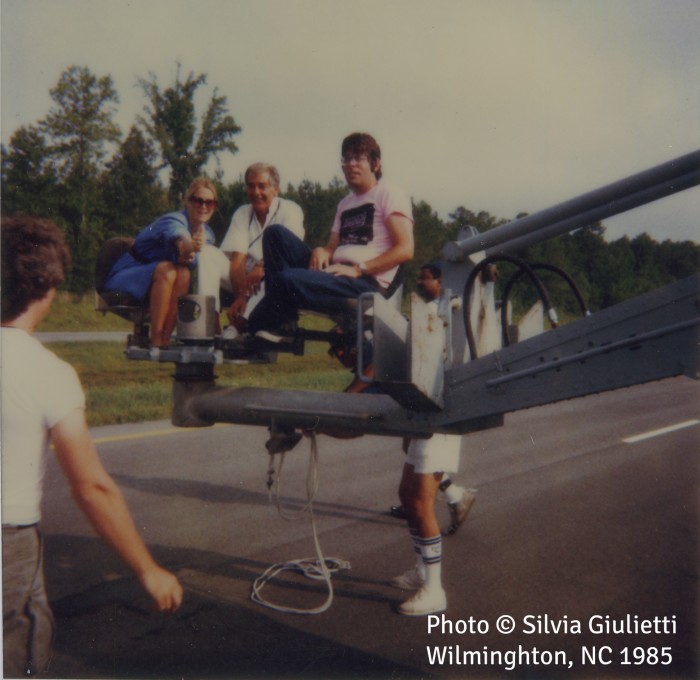 Almost immediately, Martha fell in love with the job. Martha: Because in our industry, two plus two does not make four. Interpretations take everything in another direction. And a lot of times, locations are lost, or overtime kicks in, etc. There's always something.Roberto: Plus everything can always be changed. Because, you know, the script can always be changed. Dino is the only producer I ever met that read every single line of every single screenplay. And he did it because every page tells you how much money you're going to spend. So say, for example, page one says: We open on a wide panorama of sunny Los Angeles with our hero in the middle of a helicopter chase. Dino would read this and then say, "Roberto! Change it to cars. Make it a car chase. Oh, and switch it to sunny North Carolina instead."Martha: One of Dino's first meetings every day—before even going on to set—was with the accountants. He needed an update on where everything stood with the cash flow. Credit-wise, document-wise, delivery-wise. He needed to know what a particular movie was going to cost on that particular day. And what happens if we go over budget? What could cause that to happen? Can we anticipate it? And if we were under budget—which we better be—are we getting what we want creatively? Are we getting what we need? That was Dino. And being with Dino in an office—him asking you questions like, and you being able to give him the information—it just gave you a major sense of fulfillment.Roberto: Unofficially, at some point, we knew that the two of them were an item.Martha: The first movie I worked on with Dino [initially as an outside employee] was Milos Foreman's Ragtime. I ended up effectively taking over the post process on that, as well as the delivery. And at some point along the way—in 1981—Dino asked me to join his company. So in addition to accounting, I started supervising the other films that Dino was making: Death Wish and Conan the Barbarian (which his daughter Raffaella was producing). It just became a nice working relationship with Dino. And, around this time, there had been some unfortunate events in Dino's life. He lost his son—I don't really want to talk about it—but he lost his son to a tragic plane accident and his life fell apart. His marriage fell apart. And so eventually, in his building his life back, I became part of that. So we just did everything together.Roberto: Speaking honestly, Dino could have had any woman in the world. And when he met Martha, I knew it was Italian love. Because the first thing he did was purchase the rights to several novels from the most successful novelist in the world at the time. And that man was Stephen King.Martha: Stephen's a master. He's the best.Roberto: But the reason that Dino get the novels was—on one side—to make movies, yes, but—on the other side—it was to teach his woman, the one he fell in love with, the business. So that 1) no one could say to him "you're an asshole" and 2) nobody could say to her "you don't know what you're doing." Because who could argue with buying the rights to the most successful, most read novelist in America? So we end up doing Firestarter, Cat's Eye and Maximum Overdrive. On those latter two movies, a British filmmaker named Milton Subotsky earned a credit as co-producer. That's because, a few years back, Subotsky had purchased the film rights to several stories from Stephen King's Night Shift collection. King, however, wasn't a big fan of Milton Subotsky. According to Scott Von Doviak's book Stephen King Films FAQ, King referred to Subotsky as "the Hubert Humphrey of horror" and someone who thinks, "all horror pictures should somehow be uplifting." And with "Trucks"—not unlike Cat's Eye, which was an anthology of three unrelated King stories—the plan was to package this one with "The Lawnmower Man" and "The Mangler" to create a compilation called The Machines. Subotsky moved forward with this idea, to the point that he even had a script drafted by screenwriters Edward and Valerie Abraham. Ultimately, however, he was unable to secure financing. As a result—and because he was in the midst of an unrelated lawsuit—Subotsky sold the rights to Dino De Laurentiis. Martha: Stephen actually recommended to Dino some stories from the book Night Shift that he had sold back in the 70s to Milton Sobotsky. So it was that suggestion and the fondness that Stephen had for Dino—Dino was very charming, and he loved storytellers—that led to Maximum Overdrive. But before that film actually, on Cat's Eye, Dino had given Stephen the opportunity to write his first screenplay So Stephen wrote this great script and then came and stayed with us during production and post-production. So we considered him family. He gave us his passion and his talent—and trusted us—and I hope that we always did that reciprocally. But getting back to Maximum Overdrive and your whole big question—how did this get made—it's because Stephen later said to Dino, "I want to direct." And Dino said to Stephen, "Why not? You should."
Almost immediately, Martha fell in love with the job. Martha: Because in our industry, two plus two does not make four. Interpretations take everything in another direction. And a lot of times, locations are lost, or overtime kicks in, etc. There's always something.Roberto: Plus everything can always be changed. Because, you know, the script can always be changed. Dino is the only producer I ever met that read every single line of every single screenplay. And he did it because every page tells you how much money you're going to spend. So say, for example, page one says: We open on a wide panorama of sunny Los Angeles with our hero in the middle of a helicopter chase. Dino would read this and then say, "Roberto! Change it to cars. Make it a car chase. Oh, and switch it to sunny North Carolina instead."Martha: One of Dino's first meetings every day—before even going on to set—was with the accountants. He needed an update on where everything stood with the cash flow. Credit-wise, document-wise, delivery-wise. He needed to know what a particular movie was going to cost on that particular day. And what happens if we go over budget? What could cause that to happen? Can we anticipate it? And if we were under budget—which we better be—are we getting what we want creatively? Are we getting what we need? That was Dino. And being with Dino in an office—him asking you questions like, and you being able to give him the information—it just gave you a major sense of fulfillment.Roberto: Unofficially, at some point, we knew that the two of them were an item.Martha: The first movie I worked on with Dino [initially as an outside employee] was Milos Foreman's Ragtime. I ended up effectively taking over the post process on that, as well as the delivery. And at some point along the way—in 1981—Dino asked me to join his company. So in addition to accounting, I started supervising the other films that Dino was making: Death Wish and Conan the Barbarian (which his daughter Raffaella was producing). It just became a nice working relationship with Dino. And, around this time, there had been some unfortunate events in Dino's life. He lost his son—I don't really want to talk about it—but he lost his son to a tragic plane accident and his life fell apart. His marriage fell apart. And so eventually, in his building his life back, I became part of that. So we just did everything together.Roberto: Speaking honestly, Dino could have had any woman in the world. And when he met Martha, I knew it was Italian love. Because the first thing he did was purchase the rights to several novels from the most successful novelist in the world at the time. And that man was Stephen King.Martha: Stephen's a master. He's the best.Roberto: But the reason that Dino get the novels was—on one side—to make movies, yes, but—on the other side—it was to teach his woman, the one he fell in love with, the business. So that 1) no one could say to him "you're an asshole" and 2) nobody could say to her "you don't know what you're doing." Because who could argue with buying the rights to the most successful, most read novelist in America? So we end up doing Firestarter, Cat's Eye and Maximum Overdrive. On those latter two movies, a British filmmaker named Milton Subotsky earned a credit as co-producer. That's because, a few years back, Subotsky had purchased the film rights to several stories from Stephen King's Night Shift collection. King, however, wasn't a big fan of Milton Subotsky. According to Scott Von Doviak's book Stephen King Films FAQ, King referred to Subotsky as "the Hubert Humphrey of horror" and someone who thinks, "all horror pictures should somehow be uplifting." And with "Trucks"—not unlike Cat's Eye, which was an anthology of three unrelated King stories—the plan was to package this one with "The Lawnmower Man" and "The Mangler" to create a compilation called The Machines. Subotsky moved forward with this idea, to the point that he even had a script drafted by screenwriters Edward and Valerie Abraham. Ultimately, however, he was unable to secure financing. As a result—and because he was in the midst of an unrelated lawsuit—Subotsky sold the rights to Dino De Laurentiis. Martha: Stephen actually recommended to Dino some stories from the book Night Shift that he had sold back in the 70s to Milton Sobotsky. So it was that suggestion and the fondness that Stephen had for Dino—Dino was very charming, and he loved storytellers—that led to Maximum Overdrive. But before that film actually, on Cat's Eye, Dino had given Stephen the opportunity to write his first screenplay So Stephen wrote this great script and then came and stayed with us during production and post-production. So we considered him family. He gave us his passion and his talent—and trusted us—and I hope that we always did that reciprocally. But getting back to Maximum Overdrive and your whole big question—how did this get made—it's because Stephen later said to Dino, "I want to direct." And Dino said to Stephen, "Why not? You should."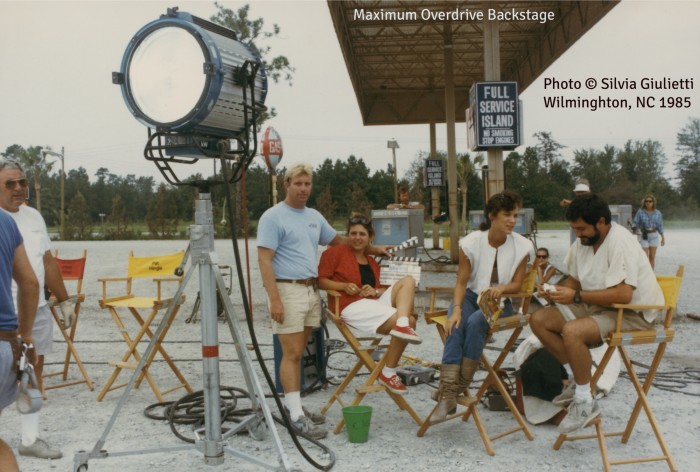
Part 2: Kid at a Circus
In May 1985, production of Maximum Overdrive began at the De Laurentiis studio in in Wilmington, North Carolina. Laura: I was just a youngster when I got the part. I think that Stephen King had seen me in Dark End of the Street—an independent film I did back when nobody even really had a way to watch independent films—but Stephen had seen me in that and he loved it. He liked the idea that I could be, sort of, this wild child. So he had me come in to audition and meet Emilio. The whole thing went well, although I must say that being from New York—where I had done a Broadway show, Richard III, with Al Pacino—I didn't really understand at the time that Emilio was a phenomenon. I don't think I'd even heard of the "Brat Pack" before that.Chip: I drove Emilio around quite a bit. I had worked as a PA on Cat's Eye the previous summer and on Maximum Overdrive got hired in set construction and literally helped build the truck stop that gets blown up in the film. And as we got closer to production, I got hired as a PA again. Mostly my job entailed getting coffee, making copies and delivering mail but, as I mentioned, I got to drive Emilio and some other actors around. I was a little awestruck because Repo Man had just come out and I loved it. And I remember one time we were driving down New Centre Drive in Wilmington—where Repo Man was playing—and Emilio's name was in big letters on the marquee. That was kind of amazing, I think, even for him.Martha: It was tough to get Emilio. But we had worked with Martin Sheen [his father] on Dead Zone, so I think that helped. And we were lucky to get him. Because he was a breaking star, and perfectly suited to play that boy next door—who you wanted to root for—especially when, all of the sudden, the world turns on him. And Emilio was—he is—such a nice human being. Caring. Earnest.
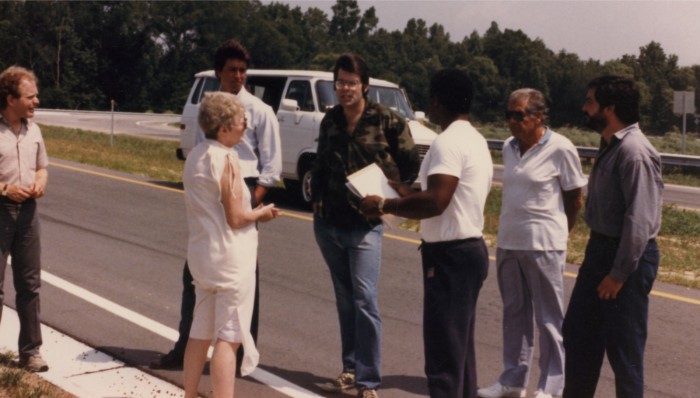
Part 3: The Incident
Silvia: I do not know if you already know, but in this movie there was a big accident. Would you like me to tell you?Joe: Yes, I was there, I'm afraid. It was kind of like the film coming to life, so to speak. It's hard to imagine it happened, but it happened.Martha: Accidents, of course, do happen. But in this case, it was probably senseless that it should have.Roberto: I remember it very well. There was Stephen King sitting off-scene on a director chair and then next to me is Armando, then his son on the camera and then Silvia.Silvia: We were shooting a scene where a lawnmower—the machine that cut the grass—was following a boy to kill him. And we put the camera on the ground with piece of wood beneath. To wedge, okay? I remember that Armando Nanuzzi ask to Stephen King, "Can we take out the blades?" But Stephen King say, "no, no, I like to see them." Armando say, "But we don't see them in the shot." But Stephen King say, "No. No. Better that you let it."Roberto: Many times, Armando say to take out the blades. And then many times, Stephen King would say, "There's no f***ing way. We have to be as real as possible."Silvia: Then Stephen King say "speed" and the lawnmower supposed to go.Joe: This lawnmower was radio-controlled and narratively it was supposed to go out of control—having a soul of its own, you know; machines taking over—and part of the scene entailed the special effects guy rigging some kind of radio control contraption to a lawnmower and then it's supposed to move around without anybody behind it.Silvia: But the first time, it did not drive. And I remember that the Special Effects say that they were raising higher the power on lawn mower. Then Stephen King say speed again and the lawnmower still not go. And the Special Effects raise high the power up again—and in my mind I say: I think it is very strong—but finally after the third time the lawnmower moved. And Stephen King did not say stop.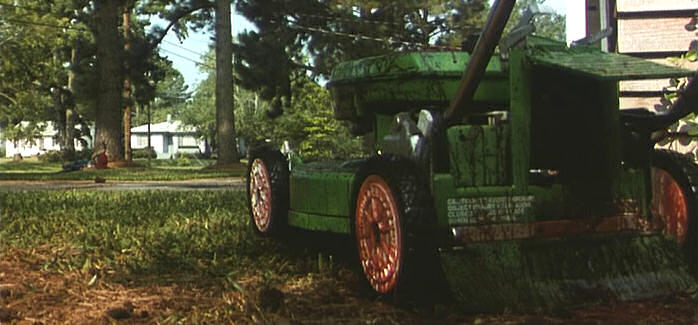 According to ensuing legal documents, the lawnmower took off "like thunder" (according to Nannuzzi) or "like a runaway horse" (according to King).Roberto: Then the lawn-mower comes as close to the camera to the point that it chews up some of the hard plastic that covers the lens. And it keeps going. Over and over.Joe: And in the process of moving it, that wedge got caught in the blade.Silvia: Then the lawnmower start to knock over the matte box. Then it start to take the camera—obviously in very few seconds—the camera operator take the camera away on the floor. The lawnmower then split the wood and five meters back there was Armando.Martha: That splint of wood—my god, the odds were a gazillion and one—that splint of wood then went into Armando's eye. For a cameraman to lose his eye...my god.Silvia: "Ow! Somebody shot me. Somebody shot me" That's what Armando said. But he said in Italian: Mi hanno sparato! Mi hanno sparato! And the blood was everywhere.Laura: That was horrific. The wood chip in his eye. Just horrific.Joe: Shocking. Disturbing. Sad. And ironic (given what the movie was about). It was just this terrible miscommunication.Silvia: I remember the police arrive immediately and very soon there was a helicopter to take him to the hospital.Roberto: They put Armando and me in a little helicopter to go to the hospital in Raleigh. And I stayed with him the whole time. I was his translator.Silvia: I remember there was a big confusion because everything was happening very quickly at the scene of Armando. It was completely dirty of blood. It was kind of scene of horror. I will never forget in all my life.Roberto: What was Armando Nannuzzi like in the helicopter? Just scared. Just the man; zero movie. "Hold my hand, I do not speak English." That's what he said. Tienimi la mano, io non parlo inglese. "Don't worry Armando," I told him. "I'm here. I'm here. Don't worry, Armando."
According to ensuing legal documents, the lawnmower took off "like thunder" (according to Nannuzzi) or "like a runaway horse" (according to King).Roberto: Then the lawn-mower comes as close to the camera to the point that it chews up some of the hard plastic that covers the lens. And it keeps going. Over and over.Joe: And in the process of moving it, that wedge got caught in the blade.Silvia: Then the lawnmower start to knock over the matte box. Then it start to take the camera—obviously in very few seconds—the camera operator take the camera away on the floor. The lawnmower then split the wood and five meters back there was Armando.Martha: That splint of wood—my god, the odds were a gazillion and one—that splint of wood then went into Armando's eye. For a cameraman to lose his eye...my god.Silvia: "Ow! Somebody shot me. Somebody shot me" That's what Armando said. But he said in Italian: Mi hanno sparato! Mi hanno sparato! And the blood was everywhere.Laura: That was horrific. The wood chip in his eye. Just horrific.Joe: Shocking. Disturbing. Sad. And ironic (given what the movie was about). It was just this terrible miscommunication.Silvia: I remember the police arrive immediately and very soon there was a helicopter to take him to the hospital.Roberto: They put Armando and me in a little helicopter to go to the hospital in Raleigh. And I stayed with him the whole time. I was his translator.Silvia: I remember there was a big confusion because everything was happening very quickly at the scene of Armando. It was completely dirty of blood. It was kind of scene of horror. I will never forget in all my life.Roberto: What was Armando Nannuzzi like in the helicopter? Just scared. Just the man; zero movie. "Hold my hand, I do not speak English." That's what he said. Tienimi la mano, io non parlo inglese. "Don't worry Armando," I told him. "I'm here. I'm here. Don't worry, Armando."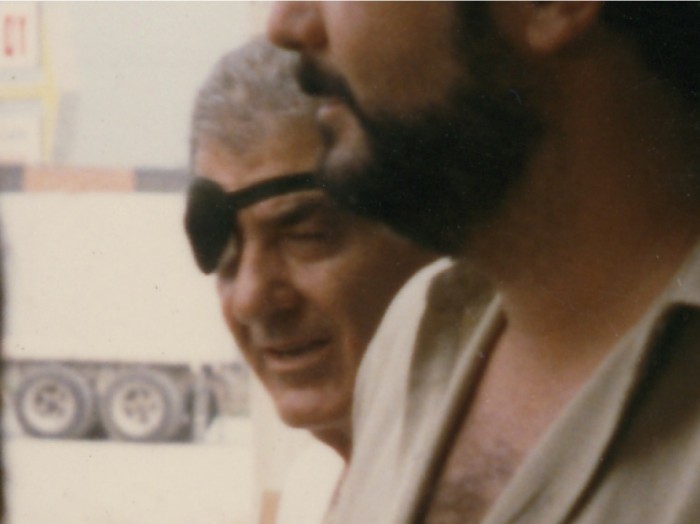
Part 4: Aftermath
Silvia: After it happen, I immediately went to the Special Effect man and I take him by the t-shirt and I say, "why you don't' stop it?" And he say, "because he [Stephen] didn't say stop." And then I run to Stephen King and I yelled very close to his face, "WHY YOU DIDN'T SAY STOP?" But he was unable to answer. He was shocked. Then we stop the movie for two weeks because we didn't know if Armando was able to work again or not. He got the surgery and, after one week, he got second surgery and then he came back. And he came with a...the bandage. How do you call?Joe: An eye-patch.Silvia: Yes, like a pirate.Joe: Yeah, think John Ford.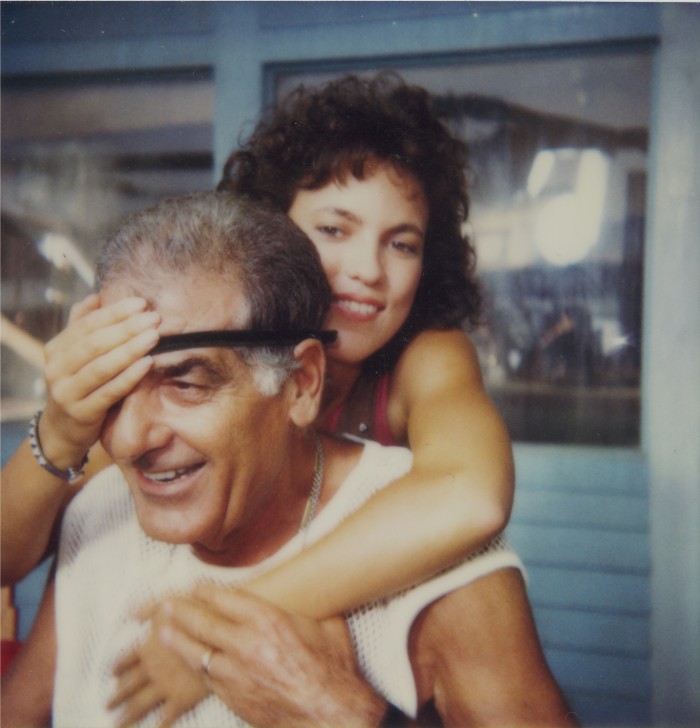 Silvia: But he came back after two weeks and I was taking care of him every day. Because I was like a daughter for him. He was doing medication with special drops and I was medicating him every day. And I have to say that Martha Schumacher—the wife of Dino De Laurentiis—was very nice. Taking care of us, because we were a little bit disoriented. Can you imagine? She paid a lot of attention. She was nice, very nice.Martha: We all felt terrible. And responsible. You know, if anything goes bad on a set it's ultimately the producer that needs to take the responsibility. And it's just really unfortunate that this happened.Silvia: But when Armando came back, we continued to work. And, I do not know why, but the atmosphere was...there was not a sad atmosphere.Joe: Because we didn't know the extent. It wasn't conclusive how bad the damage was. I remember it being more like a "hopefully it'll heal" type of thing.Martha: For him coming back—with a positive attitude and a great sense of humor—that just kind of shows what kind of a person Armando is, and what kind of a professional he is. And we showed that kindness right back to him and his family.Silvia: At the beginning, the doctors think Armando was able to recover. But in reality, it was not. Because it got damaged. You have to imagine that the iris is like a clock. If you have a damage from 12 to 4, they can repair it. But he got the damage from 12 to 8 and was impossible to rebuild it. And for years, Armando was [deep sigh] damage very big because when he came back to Italy he couldn't work like before. Because director were thinking he was not able to work any more without an eye. Because he lost the depth of field. But in reality he continued to work very well. I think he was working better, because losing the depth of field he was putting more attention to the lighting. But it was very sad because he could not get so much work. Not because of the accident, but because of enemies. Many colleagues who did not like Armando because he was the best. They were putting a bad word against him. So Armando Nannuzzi was sad not because the eye, but because the colleagues were playing very bad with him. And he think: I am old and now my career is at an end.Martha: Even today, I feel a bit of guilt that he had to suffer that. But it doesn't change anything. His medical and his financial situation were paramount; that he be treated correctly. So I certainly hope I didn't take anything away from his quality of life. And I'm sure Stephen feels the same way too. He just, he just was great.Silvia: After he return, there was also a very beautiful thing that happened. It was interesting, because Stephen King and Armando Nannuzzi were born the same day. And so when Armando came back, we celebrate this birthday. And the Special Effect was organizing a very special surprise for them.
Silvia: But he came back after two weeks and I was taking care of him every day. Because I was like a daughter for him. He was doing medication with special drops and I was medicating him every day. And I have to say that Martha Schumacher—the wife of Dino De Laurentiis—was very nice. Taking care of us, because we were a little bit disoriented. Can you imagine? She paid a lot of attention. She was nice, very nice.Martha: We all felt terrible. And responsible. You know, if anything goes bad on a set it's ultimately the producer that needs to take the responsibility. And it's just really unfortunate that this happened.Silvia: But when Armando came back, we continued to work. And, I do not know why, but the atmosphere was...there was not a sad atmosphere.Joe: Because we didn't know the extent. It wasn't conclusive how bad the damage was. I remember it being more like a "hopefully it'll heal" type of thing.Martha: For him coming back—with a positive attitude and a great sense of humor—that just kind of shows what kind of a person Armando is, and what kind of a professional he is. And we showed that kindness right back to him and his family.Silvia: At the beginning, the doctors think Armando was able to recover. But in reality, it was not. Because it got damaged. You have to imagine that the iris is like a clock. If you have a damage from 12 to 4, they can repair it. But he got the damage from 12 to 8 and was impossible to rebuild it. And for years, Armando was [deep sigh] damage very big because when he came back to Italy he couldn't work like before. Because director were thinking he was not able to work any more without an eye. Because he lost the depth of field. But in reality he continued to work very well. I think he was working better, because losing the depth of field he was putting more attention to the lighting. But it was very sad because he could not get so much work. Not because of the accident, but because of enemies. Many colleagues who did not like Armando because he was the best. They were putting a bad word against him. So Armando Nannuzzi was sad not because the eye, but because the colleagues were playing very bad with him. And he think: I am old and now my career is at an end.Martha: Even today, I feel a bit of guilt that he had to suffer that. But it doesn't change anything. His medical and his financial situation were paramount; that he be treated correctly. So I certainly hope I didn't take anything away from his quality of life. And I'm sure Stephen feels the same way too. He just, he just was great.Silvia: After he return, there was also a very beautiful thing that happened. It was interesting, because Stephen King and Armando Nannuzzi were born the same day. And so when Armando came back, we celebrate this birthday. And the Special Effect was organizing a very special surprise for them.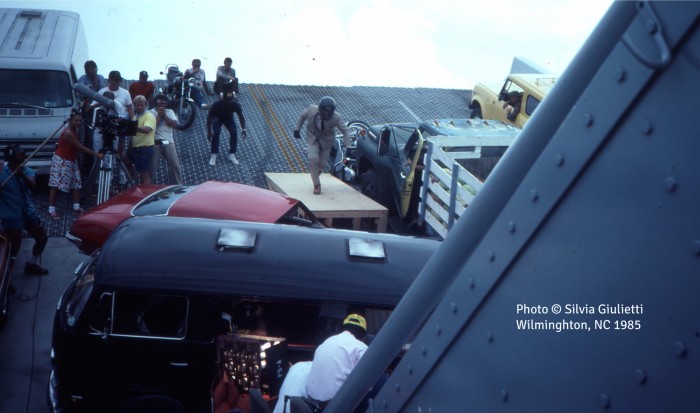 Roberto: And remember, Stephen King loved anything involving special effects.Silvia: We were in the gas station and the Special Effect come over with two controls. They gave to Armando one control and they gave to Stephen King the other control. And they say, "This is our gift. I count to three and then you pull." Okay, they understand. "One. Two. Three" Then Armando Nannuzzi and Stephen King pull it and fireworks go up. They were controlling fireworks. And every time they were pushing, a firework was exploding. Very beautiful moment.Martha: I think there was just something nice about being in North Carolina. There was a little bit more relaxed feeling. The cast and crew, they didn't have the pressure of anything else in the world and they could just make their movie. And I think everyone enjoyed being back there.
Roberto: And remember, Stephen King loved anything involving special effects.Silvia: We were in the gas station and the Special Effect come over with two controls. They gave to Armando one control and they gave to Stephen King the other control. And they say, "This is our gift. I count to three and then you pull." Okay, they understand. "One. Two. Three" Then Armando Nannuzzi and Stephen King pull it and fireworks go up. They were controlling fireworks. And every time they were pushing, a firework was exploding. Very beautiful moment.Martha: I think there was just something nice about being in North Carolina. There was a little bit more relaxed feeling. The cast and crew, they didn't have the pressure of anything else in the world and they could just make their movie. And I think everyone enjoyed being back there.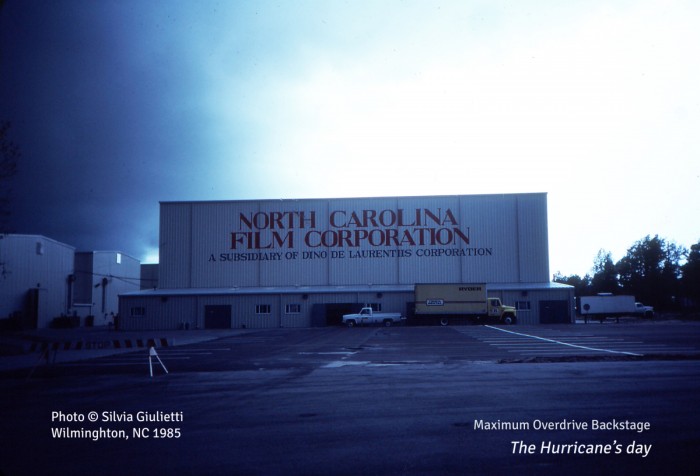 Laura: There was a very nice atmosphere. It was really fun to be sort of castaways. Especially when we had the hurricane come down.Silvia: Gloria. I remember the name was Gloria. And we were shooting 'til the last moment. I remember the atmosphere. We were shooting in a port and the sky was very dark and the atmosphere was very bad. And then was starting to rain. And then we continued to shoot inside the stage. And I remember that people were excited, that they were going outside to do a competition: who was able to cross the street from one stage to another one. It was very dangerous, but they enjoy. And we continue to work until the production stop. Then they organize to go to Hilton Hotel, which was a big building.Laura: We had to get into this emergency hotel. Everyone stuck all together.Silvia: And it was a very strange atmosphere because I remember each room we had a window with the tape. The staff of the hotel came into each room and put the mattress like a barricade. It was a kind of like bad dream. But because everyone were young, we stay together and have a lot of joy.Laura: We did have a lot of fun in the hotel. And we were all together. It was very fun, actually. With everyone thinking it was all going to blow apart. But then it didn't. And the hurricane passed. It was kind of anticlimactic.
Laura: There was a very nice atmosphere. It was really fun to be sort of castaways. Especially when we had the hurricane come down.Silvia: Gloria. I remember the name was Gloria. And we were shooting 'til the last moment. I remember the atmosphere. We were shooting in a port and the sky was very dark and the atmosphere was very bad. And then was starting to rain. And then we continued to shoot inside the stage. And I remember that people were excited, that they were going outside to do a competition: who was able to cross the street from one stage to another one. It was very dangerous, but they enjoy. And we continue to work until the production stop. Then they organize to go to Hilton Hotel, which was a big building.Laura: We had to get into this emergency hotel. Everyone stuck all together.Silvia: And it was a very strange atmosphere because I remember each room we had a window with the tape. The staff of the hotel came into each room and put the mattress like a barricade. It was a kind of like bad dream. But because everyone were young, we stay together and have a lot of joy.Laura: We did have a lot of fun in the hotel. And we were all together. It was very fun, actually. With everyone thinking it was all going to blow apart. But then it didn't. And the hurricane passed. It was kind of anticlimactic.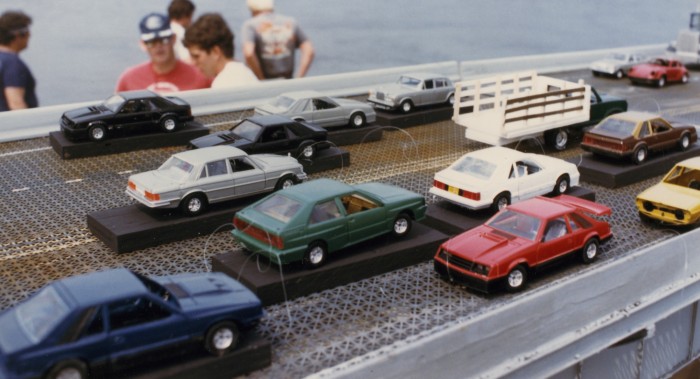 But before production ended there was a semi-climactic moment. Or at least a different moment—of death and destruction—that everyone fondly remembers. Silvia: I remember one night, Stephen King was renting an entire cinema. A cinema with two screens. He wanted that all the crew was there to watch two movies that was the favorite of him. One was Godzilla, of the 1950s. And the other one was the Night of the Living Dead. He get popcorn for all of us and then we were watching the movies with commentary with him. You can't imagine watching Godzilla—the original one, the Japanese one—with the comment of Stephen King. Was something incredible.Laura: There were a lot of good times like that. And I have very fond memories of making that movie. But there was definitely a point where we all kind of knew what this movie was going to be.Martha: Whether it didn't have enough of a story, of an emotional hook, I don't know.Laura: Because the script was what it was. Everything just felt a bit...off. None of us really felt like we got the story. I don't think there was anybody that had the feeling that this was going to work.Martha: But it's a fun movie. I mean, the first scene in the movie is Stephen going to an ATM—an old-fashioned ATM machine—it eats his stuff and he's just being Stephen King Southern. That, to me, was really the tone of the movie. Did we do the wrong tone? Maybe. But that's the sensibility that Stephen wanted to translate at that time of telling that story. And I think he delivered what he wanted to make.
But before production ended there was a semi-climactic moment. Or at least a different moment—of death and destruction—that everyone fondly remembers. Silvia: I remember one night, Stephen King was renting an entire cinema. A cinema with two screens. He wanted that all the crew was there to watch two movies that was the favorite of him. One was Godzilla, of the 1950s. And the other one was the Night of the Living Dead. He get popcorn for all of us and then we were watching the movies with commentary with him. You can't imagine watching Godzilla—the original one, the Japanese one—with the comment of Stephen King. Was something incredible.Laura: There were a lot of good times like that. And I have very fond memories of making that movie. But there was definitely a point where we all kind of knew what this movie was going to be.Martha: Whether it didn't have enough of a story, of an emotional hook, I don't know.Laura: Because the script was what it was. Everything just felt a bit...off. None of us really felt like we got the story. I don't think there was anybody that had the feeling that this was going to work.Martha: But it's a fun movie. I mean, the first scene in the movie is Stephen going to an ATM—an old-fashioned ATM machine—it eats his stuff and he's just being Stephen King Southern. That, to me, was really the tone of the movie. Did we do the wrong tone? Maybe. But that's the sensibility that Stephen wanted to translate at that time of telling that story. And I think he delivered what he wanted to make.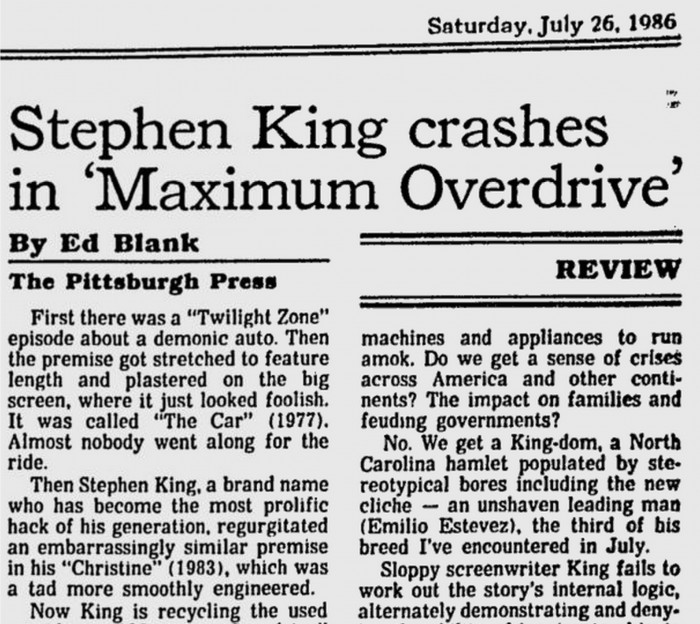
Part 5: 2 + 2 = (Anything But) 4
Maximum Overdrive was originally slated for release in March 1986. But Stephen King thought this timing was a mistake. So the distributor (MGM) agreed to delay the release until the summer if King were willing to do a publicity tour for the film. He obliged—doing things like starring in the film's trailer and VJ-ing on MTV for a week. But even so, the press was not enough to save this film. On July 25, 1986, Maximum Overdrive hit theaters and was met with terrible reviews and lousy box offices numbers. In the following years, the Master of Horror hadn't had much to say about the film until a 2002 interview with Tony Magistrale where King stated that he was "coked out of [his] mind all through its production, and really didn't know what [he] was doing."Silvia: He was using cocaine? This is a new for me. I did not realize it. But could be possible. I was very young and I was paying attention to my work.Roberto: Remember, this was the 80's. Everyone was on coke. But with Stephen King? No, I never saw. I didn't. But I did know that he was drunk. That 6 o'clock in the morning we have a roll call and he's drinking beers. And by 8:30, he's on his 10th beer.Silvia: But now that you mention this, maybe it makes sense. Every night we came to see the dailies and we were watching every take. And Stephen King was very bored. He was getting bored because the dailies were two hours. And now that you tell me this quote, I imagine that, with cocaine inside, two hours sitting is very long.Martha: I didn't know that. And perhaps he was just very good at hiding that. I don't know. I don't know. But he's certainly come out of that.Silvia: And now I also think of one more think. I remember there was fighting once between Armando and Stephen King. Not understanding something technical. So Armando was screaming very much and Stephen King was laughing because Armando was speaking Italian. Then shouting kind of gets physical. Primordial, like the animals do. But Stephen King, still, he does not stop laughing. He just keep laughing, more and more and more.Laura: In retrospect, I really liked that Stephen and I were kind of innocent through the whole thing. Though I'm sure it would have been to his benefit if I had been a little more savvy. That's why I still feel guilty about my performance. Because it was just not in my nature, to run around with a machine gun. Like, I was sort of the serious New York actor and I feel like I didn't bring the right spirit to it, you know? I was always in the circle of very big and famous people, and I was always expected to be... But I just didn't have big enough...it was very early 80s...and I just didn't have the body...or the knowledge about being that kind of girl. And I didn't know how to play that part. I knew how to do the bohemian raw emotional actress. But I didn't really get how to be the It Girl.Martha: She was great. Laura was great.Laura: A few years after this, I did What's Eating Gilbert Grape? And Lars Holmstrom would send me off into the middle of some field to wait for the time that he wanted me to come into the scene. And during that time, like in the field, I would start thinking about stories. Then one night, I was having dinner with the producer, and I said, "I think I should find a writer because I'm having all these movies out there in the field." And he said, "No, I think that means you are a writer." And he was right. Because that leap towards my own personal fame that I thought I would get for being an actress, it finally came as a writer.Joe: You just never know how things are going to turn out. Like on Maximum Overdrive, all the actors were pretty friendly and outgoing and I remember chitchatting with Yardley Smith at some point towards the end of production. She was telling me about some little animated thing that she was going to be doing on this thing called The Tracey Ulman Show. It sounded odd but, you know, that turned out to be The Simpsons.Chip: It's funny. Because, in the film class I teach, I recently shared my opinion that Maximum Overdrive is one of the worst movies ever made—which I don't say maliciously, I just find it hard to watch. And some of my students wanted to argue, saying they liked it. So, in the end, it really comes down to a matter of taste. Though it sounds like at least Stephen King agrees with me!Martha: Stephen, he did a great job. For him to write the screenplay and direct—you're the General, you have to answer everyone's desirable question—and for never having done that before, I think he did a masterful job. And for his tone and sensibilities, he delivered those unique sensibilities. It was his humor. It was kind of how he wrote. I mean, it's so funny the way that our business measures success. How many theaters? How much ancillary? How much money did you make? There are successful things in other ways. And the way Stephen sets up his stories. He's master. In a way, we all want to be scared by the Boogeyman. And Stephen is the perfect guy to tell us who that Boogeyman is. I love Stephen. And so did Dino.Roberto: When Dino died, I went to the funeral dressed completely in red. That was his favorite color. And he said that his funeral was not a death, it was a celebration of life. A success. But it was funny to me, during the eulogies, because many famous people were there and stood up to say some stuff. Small episodes of their life. Like Arnold Schwarzenegger, he stood up and said, "I remember when Dino gave me the boat." This was for Conan. Dino had just bought a beautiful wooden boat from Venezia and Arnold asked: can I have it to go skiing on the lake? And Dino said yeah, yeah, of course. And so, at the funeral, everyone had stories like this. But as soon as the ceremony ends, and every starts walking out, all the people who used to work for him—like Mindy Alberman and Mark DeBacco—we look at each other and we say, "but they don't know what Dino said last!" Because, okay, Schwarzenegger was allowed to take the boat. But after Dino would say yes, he'd turn around and say to us, "that motherf***er is gonna ruin my boat. It's a $150,000 fresh-water boat! F*** Arnold."Martha: [laughing] You want to know what 2 plus 2 actually equals in the film business? [laughing again] Anything but four. So whether it comes out on the minus side or the plus side, what you've got planned is never going to happen. And so, what I love about this industry— and then you can also apply it to your own life —is anticipating things. Anticipating situations of change or failure and then starting all over with what you now know. And that's what I think film producing has taught me the most: don't give up. That's what Dino was all about. He never gave up. That was Dino. And I still have him here on my shoulder all the time. He's always here with me; he's always on my shoulder.